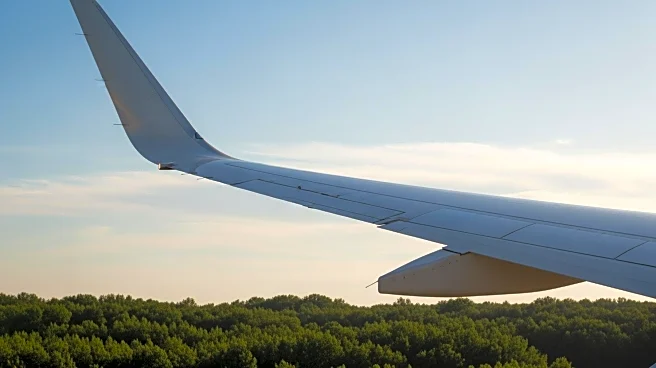What's Happening?
Major European airlines, including Lufthansa and Air France, have committed to halting misleading environmental claims related to carbon offsetting for flights. This decision, announced by the European Commission,
coincides with the UN COP30 climate conference in Brazil, emphasizing the EU's dedication to eliminating greenwashing in aviation. The airlines have agreed to avoid vague language and ensure future environmental claims are backed by concrete data and timelines. This move follows consumer complaints and legal actions against airlines for deceptive advertising regarding eco-friendly travel.
Why It's Important?
The commitment by these airlines marks a significant shift in the aviation industry's approach to sustainability. By moving away from misleading marketing practices, airlines are expected to enhance transparency and consumer trust. This change could influence the industry's overall environmental impact, as airlines are encouraged to adopt more sustainable practices, such as using Sustainable Aviation Fuels (SAF). The collective agreement of 21 airlines, which handle a substantial portion of Europe's air traffic, could set a precedent for global aviation standards, potentially accelerating the industry's progress towards net-zero emissions by 2050.
What's Next?
As the airlines implement these changes, they will need to provide clear CO2 emissions data for flights, allowing passengers to understand the environmental impact of their travel. The European Commission's initiative aims to boost consumer choice and align corporate responsibility with governmental climate goals. The success of this commitment will depend on effective enforcement and the industry's ability to transition to sustainable practices, such as increased use of SAF. Environmental groups have welcomed the announcement, highlighting the need for continued vigilance to ensure genuine progress.
Beyond the Headlines
The move away from carbon offsetting schemes, which often involve tree planting, towards SAF represents a more direct approach to reducing emissions. However, the availability and scalability of SAF remain challenges for the industry. The legal precedents set by previous rulings against airlines for misleading advertisements underscore the importance of regulatory oversight in achieving genuine sustainability. As the aviation sector navigates these changes, the focus will be on balancing consumer expectations with practical environmental solutions.










